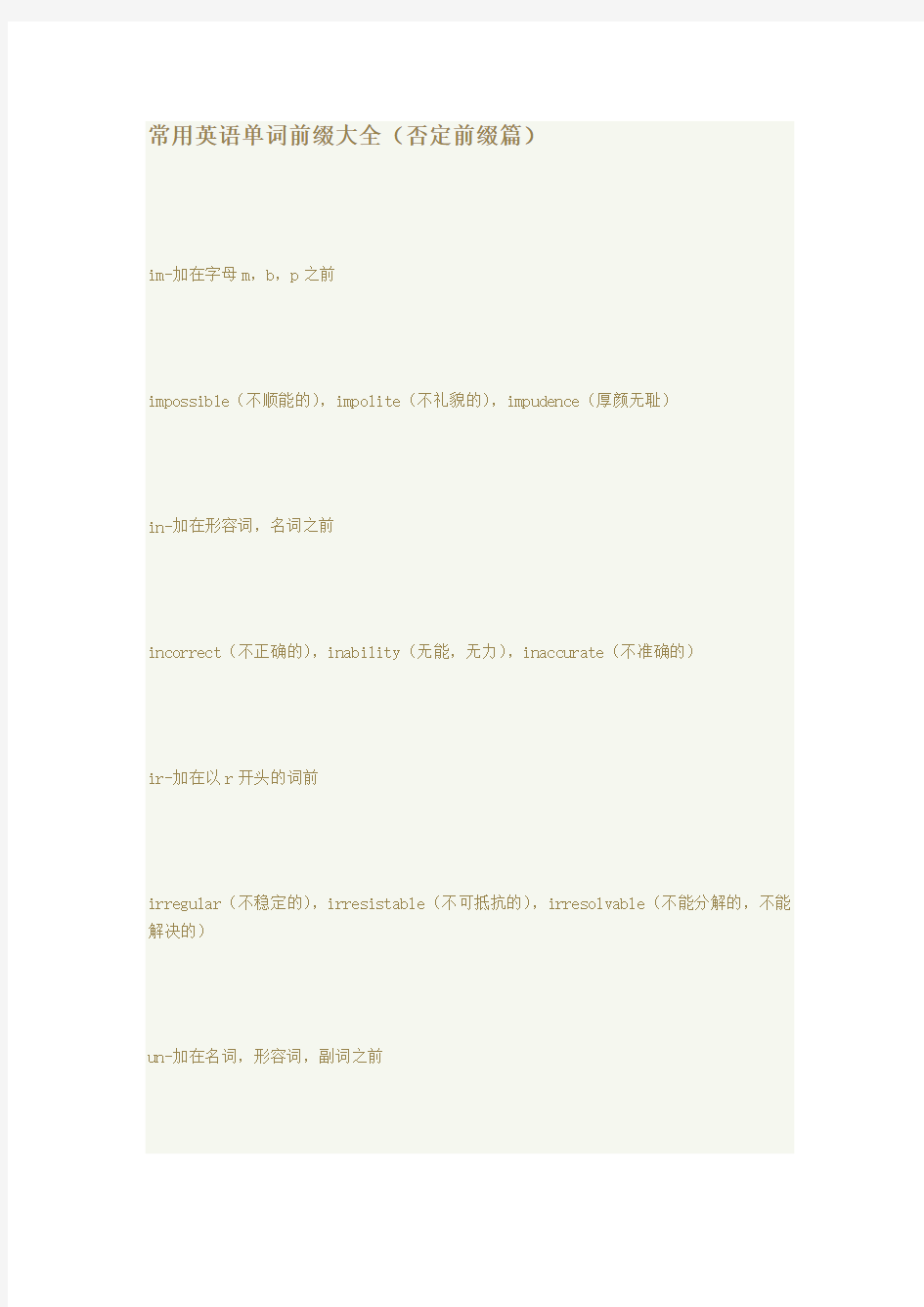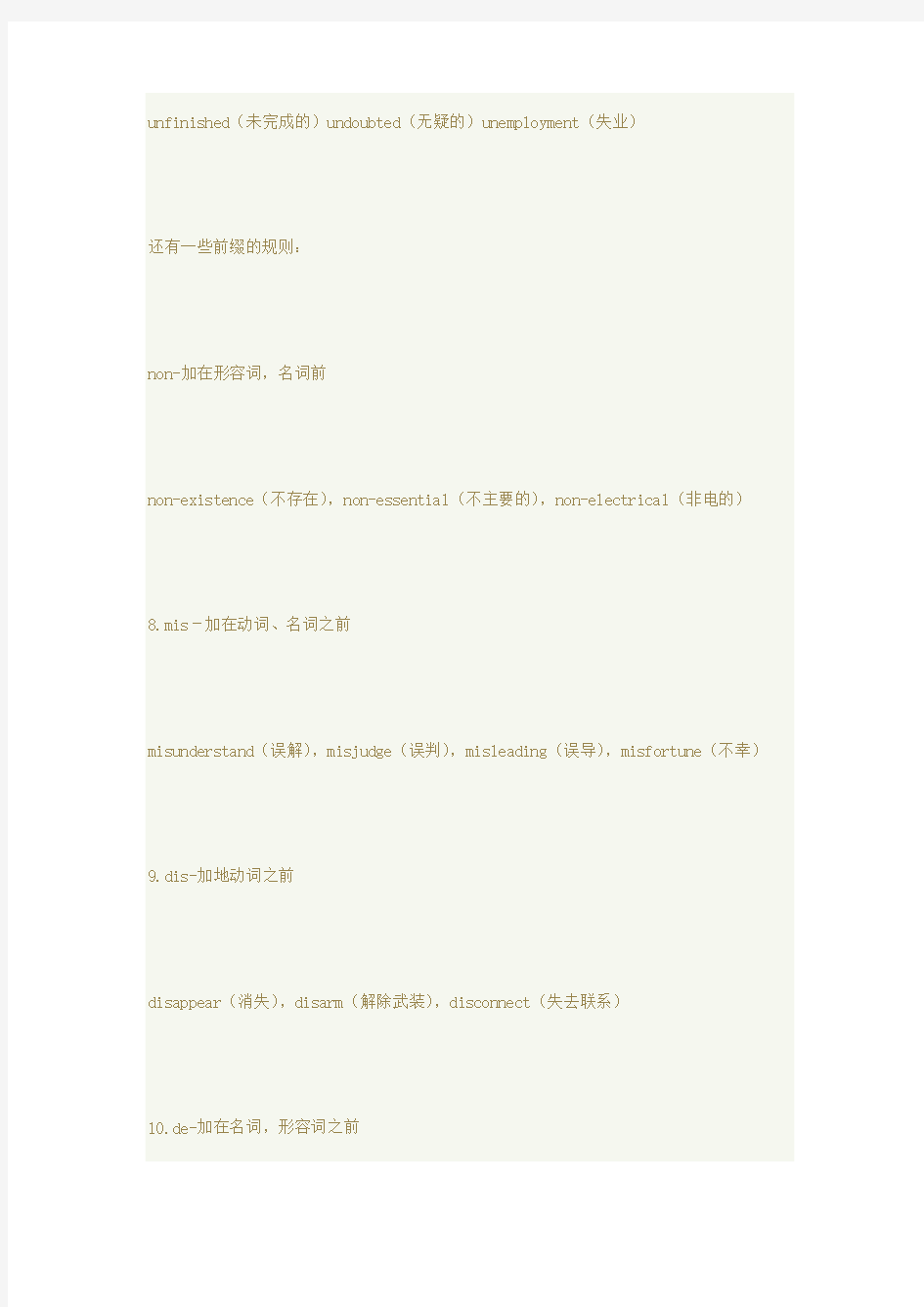英文否定前缀总结


常用英语单词前缀大全(否定前缀篇)
im-加在字母m,b,p之前
impossible(不顺能的),impolite(不礼貌的),impudence(厚颜无耻)
in-加在形容词,名词之前
incorrect(不正确的),inability(无能,无力),inaccurate(不准确的)
ir-加在以r开头的词前
irregular(不稳定的),irresistable(不可抵抗的),irresolvable(不能分解的,不能解决的)
un-加在名词,形容词,副词之前
unfinished(未完成的)undoubted(无疑的)unemployment(失业)
还有一些前缀的规则:
non-加在形容词,名词前
non-existence(不存在),non-essential(不主要的),non-electrical(非电的)8.mis-加在动词、名词之前
misunderstand(误解),misjudge(误判),misleading(误导),misfortune(不幸)9.dis-加地动词之前
disappear(消失),disarm(解除武装),disconnect(失去联系)
10.de-加在名词,形容词之前
demobilize(遣散;使…复员) decolor (脱色,漂白)
11.anti-加在名词、形容词之前
anti-Japanese(抗日战争),anti-social(厌恶社会的,反社会的),antidite(解毒药)12.counter-加在名词、动词前
counterattack(反攻,反击),counteract(抵抗,阻碍)counterrevolution(反革命)
dis(not, the opposite of)
disadvantage, dislike, disagree, disappear, disarm, disaster, disastrous, disap point, disable, disability, discharge, disclose, discount, discourage, discove r, discovery, discrepancy, disease, disgrace, disguise, disgust, dishonor, dish onest, dislike, dismay, disorder, dispatch, disperse, displace, displacement, d isplease, disregard, dissatisfy, distort , distract, disintegrate, isparage, di spassion, disproportionate
2) in- (not, in, into)
inability, incorrect, inability, incapable, indirect, inhuman, injustice, infor mal, inside, include, inclusive, income, increase, increasingly, incredible, in definite, independence, independent, indifferent, indirect, indispensable, indi vidual, indoor, inertia , inevitable, infamous , infinite, inhabit , inhabitan t, inherent , inject, inland , inlet , inner, innocent, innumerable , input, in quire, inquiry, insane, insensitive, insert, inside, insight, insist, inspect, inspiration , inspire, install, installation, installment , instance, instant, instinct, insulate , intense, interior, internal, into, intrinsic, invade, inva lid , invaluable , invariably , invasion, invert , investigate, invisible, invo lve, inward, incomplete, indecisive, inedible, inept, inevitably, infection, in firm, injection, innate, insatiable, insecurity, insider, insidious
3) im-
(not, in, into) impossible, imbalance, immature, immoral, impatient, implicit , impress, impression, import, immigrate, imprison, immerse
4) il- (not)
illegal, illiterate, illogical ir- (not) irregular, irresponsible, irrespective 5) un- (not)
unable, uncover, undo, undoubtedly, undress , uneasy, unemployment , unexpecte d, unfold , unfortunately, unimportant, unlike, unload, unusual, unaware, enlig htened, unparalleled, unsustainable,
6) non- (not)
nonsmoker, nonexistence, non-cooperation, nonstop, nonmetal, nonresident, nonse nse, nonfundamentalist, nonspecialist
7) mis- (wrong, wrongly)
mislead, misspell, misstep, misfortune, misuse, misguided, misinformation
8) de- (showing the opposite, to remove, to reduce)
deform, deface, demobilize, destruction, deforest, denationalize, depress, depr ession, decode, decrease, degenerate , degrade , descend, descendant , descent
初中考英语八大时态总结
巧用英语时态表,掌握英语谓语形式 一、英语时态名称的记忆 二、英语时态形式的记忆:(以动词work为例) 可以分两个步骤记忆: 1、一般现在时: work(当主语是第三人称单数时,谓语动词也要用第三人称单数形式。) 现在进行时: be + working (be随主语人称和数的变化而变化。) 现在完成时: have + worked (have随主语人称和数的变化而变化,worked 是work的过去分词。) 这三种基本时态形式位于时态表的中心位置,是必须首先记住的。其它形式可推导而出。
2、记住了上面三种时态的形式后,可以设想把时间提前至过去,这三种时态的形式就相应地左移一格成为一般过去时:worked (worked是work的过去式);过去进行时was / were + working;过去完成时had + worked (worked是work 的过去分词)。 把时间错后至将来,这三种时态的形式也就相应地右移一格成为 一般将来时: shall / will + work; 将来进行时: shall / will + be working; 将来完成时: shall / will + have worked。(shall仅用于主语是第一人称时,will可用于主语是任何人称时。)当然,根据shall / will 的用法要求,紧随其后的动词或助动词要用原形形式。 简而言之,把这三种现在时态形式左移变成三种过去时态形式,只需把第一个动词变成过去式即可(一般现在时谓语只有一个动词,也可把它看成为第一个动词)。与此类似,过去将来时的变化是在一般将来时的基础上把第一个动词变成过去式。把这三种现在时态形式右移变成三种将来时态形式,只需在前面加一助动词shall / will (紧随其后的动词或助动词用原形形式)即可。 三、英语被动语态形式的记忆(以动词ask为例)
考研英语单词中的前缀(prefix)和后缀(suffix)大总结
常见前缀(prefix)和后缀(suffix)大总结 ★1.表示否定意义的前缀 1) 纯否定前缀 a-, an-, asymmetry(不对称), asexual, amoral dis- dishonest, dislike in-, ig-, il-, im-, ir-, incapable, inability, ignoble, impossible, immoral, illegal, irregular ne-, n-, none, neither, never non-, nonsense neg-, neglect un- unable, unemployment 2)表示错误的意义 male-, mal- malfunction, maladjustment(失调,不适应) mis- mistake, mislead, misunderstanding pseudo- pseudonym(假名), pseudoscience 3)表示相反动作的意思 de- defend , decompose dis- disarm, disconnect un-, unload, uncover 4)表示相反,相互对立意思 anti-, ant- antiknock( 防震), antiforeign,(排外的) contra-, contre-, contro-, contradiction counter-, counterreaction, counterbalance ob-, oc-, of-, op- object, oppose, occupy with- withdraw, withstand ★2. 表示空间位置,方向关系的前缀 1)a- 表示“在……之上”,“向……” aboard, aside, 2)by- 表示“附近,邻近,边侧” bypath, bypass(弯路) 3)circum-, circu-, 表示“周围,环绕,回转” circumstance, circus 4)de-, 表示“在下,向下” descend, degrade 5)en-, 表示“在内,进入” encage, encamp 6)ex-, ec-, es-, 表示“外部,外” exit, expand, export 7)extra-, 表示“额外”
国际学术会议常用语(英语)
学术会议常用表达 1. 有关会议的一般信息 (1)名称 conference academic conference international conference symposium annual meeting/symposium/conference forum, international forum workshop (2)日期 dates/important dates/key dates (3)地点 location/venue conference location/venue (4)主题 issues/themes/(main)topics/scope of conference conference themes/topics topic of interests 2.论文征稿、提交与录用 call for abstract/proposal/paper paper deadline deadline for abstract/full paper/proposal submission submission deadline deadline extended date for mortification of acceptance Paper acceptance/rejection will be informed by… deadline for authors notification camera ready version deadline 3. 会议注册 deadline/closing date for registration registration form registration information registration fees and items official invitation letter payment telegraphic transfer only bank transfer bank draft/check 4. 会议进程及容 conference schedule/program preliminary conference program final conference program opening ceremony/session keynote session/parallel session/tutorial session keynote speech oral presentation poster presentation tea/coffee
英语单词常见前后缀词根总结
英语单词常见前后缀词根总结 中国人在学习英语的过程中,感到最困难的就是记忆单词,这在很大程度上是因为我们对英语的构词规律缺乏熟悉和分析。假如我们对英语单词的结构像对汉语的偏旁、部首一样熟悉,记忆英语单词就不会那么枯燥、乏味了。在汉语中,当我们见到"财"、"贩"、"购"、"资"、"货"等字时,从部首"贝"就知道它们都与钱有关。英语单词同样是由词缀和词根构成的,词缀分为前缀和后缀 常见前缀 1. a,an: ①无,不,非astable不稳定的acentric无中心的 ②含有in,on,at,by,with,to等意义asleep在熟睡中ahead向前 2.ab: 脱离abnormal不正常的abaxial离开轴心的 3.anti: 反抗antiwar反战的anti?imperialist反帝的 4.auto:自动,自己autobiography自传autostable自动稳定 5.be: 使…加强belittle使缩小befriend友好相待 6.bi:二,双biweekly双周刊biligual两种语言的 7.co,col,com,con,cor 共同cooperation协作collaboration协作,勾结combine联合correlation相互关系 8.counter,contra: 反,对应counteraction反作用contrast对比,对照 9.di,dif,dis: 否定,相反diffident不自信的dislike不喜欢 10.en,em: 使… enlarge扩大enable使…能empower使…有权力 11.e,ex: 外,出external外部的erupt喷出 12.extra: 以外,超过extraordinary格外的extrasolar太阳系以外的 13.hyper: 在上,超hyperfrequency超高频hypersonic超声的 14.il,im,in,ir: 否定illogical不合逻辑的impossible不可能的invisible 不可见irrational不合理的 15.inter:互相interchange交换interlock连锁 16.intra,intro: 在内,内部intrapersonal个人内心的introspect内省 17.mal: 恶,不良maltreat虐待malfunction机能失常
会议总结英文范文会议总结写
会议总结英文范文会议总结写 会议活动总结写作方法: 1、会议提出了哪些工作事项。 2、这些事情中有哪些需要用你个人的技巧去解决,或需要你个人的脑子去解决,让领导看到你是用心用脑在工作,即使没有问题,你也要写出遇到有难度的问题,然后通过你的努力解决了,没有给公司带来负担或者带来哪些效益。 3、你对会议内容的认识。 4、通过会议展开,今后的工作你还要提高哪些能力或者需要再补充哪方面的知识,并已开始着手去做,去学了。 5、上司喜欢自动自发的人,而不是推一推动一下的人。所以,会议没有分派到你的工作但是你分内的工作,你要先有做的准备。 会议活动总结的注意事项: 1、一定要实事求是,成绩不夸大,缺点不缩小,更不能弄虚作假。这是分析、得出教训的基础。
2、条理要清楚。总结是写给人看的,条理不清,人们就看不下去,即使看了也不知其所以然,这样就达不到总结的目的。 3、要剪裁得体,详略适宜。材料有本质的,有现象的;有重要的,有次要的,写作时要去芜存精。总结中的问题要有主次、详略之分,该详的要详,该略的要略。 会议申请书 上级团组织: 为加强团组织的建设,正规团组织内部各项规章制度,按照组织规定,现向上级组织正式提出召开全体团员大会的申请,具体时间安排和会议内容如下: 一、时间安排 本月25日下午. 二、会议内容
1.团员选举产生团总支书记. 2.选举产生团支部委员 3.选举产生支部书记 4.选举产生团代会代表. 三、各项要求 以上意见当否,请批评指正! ********* 年月日 会议总结报告怎么写 一、会议报告的性质 (一)会议报告的概念
会议报告,是在重要会议和群众集会上,主要 ___或相关代表人物发表的指导性讲话。它是一种书面文字材料,又是会议文件的重要组成部分和贯彻会议精神的依据,还是供查阅的历史资料。它包括政治报告、工作报告、动员报告、总结报告、典型发言、开幕词、闭幕词等。会议报告具有宣传、鼓动、教育作用。这些作用是通过报告人的报告和听众的接受来实现的。因而,有时为了让更多的人知道报告内容,广播电台、电视台可进行现场转播,报刊也可登载。如党的十七大报告。 (二)会议报告的特点 1.理论性和逻辑性。会议报告是 ___在大型会议上或重要场合作的有关政治、经济、文化和局势等方面的报告,是以领导或领导代表的身份站在决策集团角度上所发表的讲话。它在广泛深入调研、充分占有材料的基础上,纵览全局,找准焦点,围绕实际工作中出现的问题,尤其是那些迫切需要解决的,带有普遍性的,人民群众最关心、最直接、最现实利益问题进行透彻分析,细致研究,从而抓住问题的关键,对症下药,达到推动各项工作健康发展的目的。所以,在分析研究中,它必须依据有关方针政策,结合实际地对所提建议、对策、问题等进行认真研究,反复推敲,从理论和实际的结合上把握哪些是最有价值、最需要解决的问题,它充分考虑所提意见的针对性、正确性、合理性、可靠性,使意见和措施能真正有
(完整版)初中英语语法八大时态总结,推荐文档
初中英语语法八大时态 一.一般现在时 1.结构 肯定句式: 主语+动词原形/动词的第三人称单数+其他 否定句式: 主语+(助动词)don't/doesn't +动词原形+其他 一般疑问句式: Do/Does+主语+动词原形+其他 简略回答: (肯)Yes,主语+do/does (否)No,主语+do/does not 缩写形式: don't = do not doesn't = does not 例句:He often goes swimming in summer. I usually leave home for school at 7 every morning. 2.用法 1)表示经常的、习惯性的动作或存在的状态,常与表示频度的副词连用。 常用的频度副词有:always、often、usually、seldom、never、sometimes, every week (day, year, month…), once a week, on Sundays.频度副词在句中通常放在行为动词之前,系动词、助动词之后。 例如: He often goes swimming in summer. I usually leave home for school at 7 every morning. 2)表示主语具备的性格、特征和能力等。 例如:All my family love football . My sister is always ready to help others . Ann writes good English but does not speak well. 3)表示客观真理、客观存在、自然现象。 例如:The earth moves around the sun. Shanghai lies in the east of China. 4)表示按计划或安排好的,或将要发生的动作,可用一般现在时表将来。 但只限于start,begin,leave,go,come,arrive,return,take place等。 例如:The train leaves at six tomorrow morning. He comes back tonight. 5)在复合句中,当主句是一般将来时,时间或条件状语从句的谓语动词只能用一般现在时来表示将 来要发生的动作。 例如:I'll tell him the news when he comes back. If you take the job , they will talk with you in greater details. 二.一般过去时态 1.结构 肯定句式: 主语+动词过去式+其他 否定句式: 主语+(助动词)didn’t +动词原形+其他 一般疑问句式: Did+主语+动词原形+其他 简略回答: (肯)Yes,主语+did (否)No,主语+did not 基本结构否定句一般疑问句
英语单词中常见前缀(prefix)和后缀(suffix)大总结
英语单词中常见前缀(prefix)和后缀(suffix)大总结 英语单词中常见前缀(prefix)和后缀(suffix)大总结 ★ 1.表示否定意义的前缀 1) 纯否定前缀 a-, an-, asymmetry(不对称), asexual, amoral dis- dishonest, dislike in-, ig-, il-, im-, ir-, incapable, inability, ignoble, impossible, immoral, illegal, irregular ne-, n-, none, neither, never non-, nonsense neg-, neglect un- unable, unemployment 2)表示错误的意义 male-, mal- malfunction, maladjustment(失调,不适应) mis- mistake, mislead, misunderstanding pseudo- pseudonym(假名), pseudoscience 3)表示相反动作的意思 de- defend , decompose dis- disarm, disconnect un-, unload, uncover 4)表示相反,相互对立意思 anti-, ant- antiknock( 防震), antiforeign,(排外的) contra-, contre-, contro-, contradiction counter-, counterreaction, counterbalance ob-, oc-, of-, op- object, oppose, occupy with- withdraw, withstand ★ 2. 表示空间位置,方向关系的前缀 1)a- 表示“在……之上”,“向……” aboard, aside,
会议总结报告怎么写
会议总结报告怎么写 一、会议报告的性质 (一)会议报告的概念 会议报告,是在重要会议和群众集会上,主要领导人或相关代表人物发表的指导性讲话。它是一种书面文字材料,又是会议文件的重要组成部分和贯彻会议精神的依据,还是供查阅的历史资料。它包括政治报告、工作报告、动员报告、总结报告、典型发言、开幕词、闭幕词等。会议报告具有宣传、鼓动、教育作用。这些作用是通过报告人的报告和听众的接受来实现的。因而,有时为了让更多的人知道报告内容,广播电台、电视台可进行现场转播,报刊也可登载。如党的十七大报告。 (二)会议报告的特点 1.理论性和逻辑性。会议报告是领导人在大型会议上或重要场合作的有关政治、经济、文化和局势等方面的报告,是以领导或领导代表的身份站在决策集团角度上所发表的讲话。它在广泛深入调研、充分占有材料的基础上,纵览全局,找准焦点,围绕实际工作中出现的问题,尤其是那些迫切需要解决的,带有普遍性的,人民群众最关心、最直接、最现实利益问题进行透彻分析,细致研究,从而抓住问题的关键,
对症下药,达到推动各项工作健康发展的目的。所以,在分析研究中,它必须依据有关方针政策,结合实际地对所提建议、对策、问题等进行认真研究,反复推敲,从理论和实际的结合上把握哪些是最有价值、最需要解决的问题,它充分考虑所提意见的针对性、正确性、合理性、可靠性,使意见和措施能真正有助于解决实际问题。因而,会议报告既注重事实分析,又必须从理论的高度上进行归纳概括,进而指导实践,有较强的理论性和逻辑性。 2.双向性和交流性。会议报告依据讲话稿直面听众公开发表讲话,具有直接性、当众性、范围广、影响大的特点,在领导活动中具有特殊的地位和作用。正是由于这种面对面的宣讲传播形式,就使主体和客体之间在时间、空间上的结合比较紧密,“报告”的成功与否,不决定于形式,即过程的结束,很大程度取决于主体对客体的“磁性”交流强度,即吸引力的大校这种报告的吸引力既决定于报告的文采或领导的演讲口才,又决定于听众是否接受。而且更关键的还取决于报告内容是否为受众认可,是否反映了实际情况。所以,会议报告实际上是一种在时间、空间上获得统一的、由报告主体和受众客体双向结合的交流形式。 3.切实性和针对性。会议报告的核心,是对实际问题的分析和解决。它一般要总结成绩经验、说明现状和存在问题,部署工作,规划未来等。它要求在分析的基础上提出解决问题的意见或对策,具有很强的
英语单词常见前后缀总结
英语单词常见前后缀总结背单词必看 *******前缀********* a,an ①无,不,非 astable不稳定的 acentric无中心的 ②含有in,on,at,by,with,to等意义asleep在熟睡中 ahead向前ab脱离 abnormal不正常的 abaxial离开轴心的 anti反抗 antiwar反战的 anti imperialist反帝的 auto自动,自己 autobiography自传 autostable自动稳定 be使…加强 belittle使缩小 befriend友好相待 bi二,双 biweekly双周刊 biligual两种语言的 co,col,com,con,cor 共同 cooperation协作 collaboration协作,勾结 combine联合 correlation相互关系 counter,contra反,对应 counteraction反作用 contrast对比,对照 di,dif,dis否定,相反 diffident不自信的 dislike不喜欢en,em使… enlarge扩大 enable使…能 empower使…有权力 e,ex外,出 external外部的 erupt喷出 extra以外,超过 extraordinary格外的 extrasolar太阳系以外的 hyper在上,超 hyperfrequency超高频 hypersonic超声的 il,im,in,ir否定 illogical不合逻辑的 impossible不
可能的 invisible 不可见irrational不合理的 inter互相 interchange交换 interlock连锁 intra,intro在内,内部intrapersonal个人内心的introspect内省 mal恶,不良 maltreat虐待 malfunction机能失常 micro显微镜 microware微波 mid中,中间 mid air半空中 midstream中流 mini小 minibus小公共汽车 ministate小国 mis错,坏 mistake错误 misspell拼错 multi多 multiparty多党的 multilingual多种语言的 non否定 nonsmoker不抽烟的人 nonexistent不存在的 out超过,过度,外,出,除去 outgo走得比…远 outgrow长得太大 outdoor户外的 outroot除根over上,过度 overwork工作过度 overbridge天桥 post后 postwar战后 postnatal诞生后的 pre前,领先 prewar战前的 prefix前缀 re回,再 return返回 restart重新开始 semi半 semicircle半圆 semiconductor半导体 sub,suc,suf,sup次,亚,在下,低于 substandard低于标准规格的succeed继承suffix后缀supplement增补
初中英语语法八大时态总结
初中英语语法八大时态 1.结构 肯定句式: 主语+动词原形/动词的第三人称单数+其他 否定句式: 主语+(助动词)don't/doesn't +动词原形+其他 一般疑问句式: Do/Does+主语+动词原形+其他 简略回答: (肯)Yes,主语+do/does (否)No,主语+do/does not 缩写形式: don't = do not doesn't = does not 例句:He often goes swimming in summer. I usually leave home for school at 7 every morning. 2.用法 1)表示经常的、习惯性的动作或存在的状态,常与表示频度的副词连用。 常用的频度副词有:always、often、usually、seldom、never、sometimes, every week (day, year, month…), once a week, on Sundays.频度副词在句中通常放在行为动词之前,系动词、助动词之后。 例如: He often goes swimming in summer. I usually leave home for school at 7 every morning. 2)表示主语具备的性格、特征和能力等。 例如:All my family love football . My sister is always ready to help others . Ann writes good English but does not speak well. 3)表示客观真理、客观存在、自然现象。 例如:The earth moves around the sun. Shanghai lies in the east of China. 4)表示按计划或安排好的,或将要发生的动作,可用一般现在时表将来。 但只限于start,begin,leave,go,come,arrive,return,take place等。 例如:The train leaves at six tomorrow morning. He comes back tonight. 5)在复合句中,当主句是一般将来时,时间或条件状语从句的谓语动词只能用一般现在时来表示将来要发生的动作。 例如:I'll tell him the news when he comes back. If you take the job , they will talk with you in greater details. 1.结构 肯定句式: 主语+动词过去式+其他 否定句式: 主语+(助动词)didn’t +动词原形+其他 一般疑问句式: Did+主语+动词原形+其他
英语单词前缀和后缀总结
PREFIX 1.a-:of;on;intensive;negative,not,without;ad-;ab-. 2.ab-:away from,off. 3. ad-:to;at;for. 4. aer(o)- :relating to air . 5.al-:all. 6.ambi-:on both sides,around. 7.amphi-:on both sides,around. 8.an-:negative,not,without. 9.ana-:upon,up,on. 10.ante-:before. 11.anti-:against. 12.arch-:chief,first . 13.astro- :relating to stars .(planets \space ) 14.aqu(a)-:relating to water. 15.audi (o)-:relating to sound and hearing . 16.auto-:self,without help . 17.be-:to make;to cover with;upon;by;intensive. 18.bene-:well,good. 19.bi-:double,two. 20.bio- :relating to life and living things . 21.by-:less important ;near . 22.cata-:down,downwoards. 23.cent(i)-:hundred ,hundredth . 24.circum-:around,round about. 25.con-:together with,wholly. 26.contra-:against,opposit.(contro-,counter-) 27.cross-:through;across;many. 28.de-:down,downward;apart;negative;intensive. 29.deca-:ten. 30.deci- :tenth . 31.demi-:half. 32.di-:double,twice. 33.dia-:through,between,across. 34.dich(o)-:two. 35.dis-:apart; negative;intensive. 36.duo-:two,double.(du-,dou-,do-) 37.dys-:badly,ill. 38.en-:to make;to put in(on \around ). 39.epi-:upon. 40.eu-:well. 41.ever-:more and more,always. 42.ex-:out,outward;beyond;former. 43.extra-:beyond.
会议总结英文范文模板【实用】
导语:会议的重要性是根据内容来定的,那么会议的总结怎么写,以下为大家介绍会议总结英文模板,欢迎大家阅读参考! 总结会议 Concluding a Business Meeting Action公司第三季会议在各部门负责人一一报告,以及与会者热烈讨论之后,即将落幕。会议主持人Jennifer,此时再度上台,为会议做个总结。 That wraps up the last item on the agenda. Before we close, are there any questions? Fine. In summary, I think we agree that this quarter's domestic sales figures show a marked trend in microwave sales. Sam, I'd like you to follow up on that, please. Let's see where this is heading. Jane, thank you for the prehensive PR status report. I understand there are still a few problems to be worked out, but we all trust in your ability. Ladies and gentlemen, the new design is satisfactory. Let's keep Action ahead of the game. Finally, I appreciate your ments and suggestions about the Canadian sales outlook. This is our first opportunity to promote our products in North America, so we certainly want to cover every detail. Well, then, that covers everything. I make a motion to close the third quarterly meeting of Action Appliances. Is there a second? 短语解说 wrap up 完成;结束 这是个口语用法,意同"conclude"、"finish"和"close"。主词可以是人或物。 I'd like to quickly wrap up this meeting, so we can go home. 我想赶快把这个会议结束,那我们就可以回家。 marked trend 明显的趋势 "marked"是过去分词当形容词,有‘醒目的、明显的’意思;"trend"是指事物或社会现象变动的趋势。 Judging from the graph, you can see a marked trend upward on the Japanese stock exchange. 依照这张图表,你们可以看出日本股市明显地上涨。 follow up on (something) 进一步了解 "follow"原是「跟随」的意思;这个词组是指注意某事发展,并进一步深入地了解它。介系词"on"之后所跟的名词词组即代表需要了解的事。 We can take care of that problem when we follow up. 等我们更进一步地了解问题后,就容易解决了。
英语常见前缀后缀
英语单词中常见前缀(prefix)和后缀(suffix)大总结 ★1.表示否定意义的前缀 1) 纯否定前缀 a-, an-, asymmetry(不对称), asexual, amoral dis- dishonest, dislike in-, ig-, il-, im-, ir-, incapable, inability, ignoble, impossible, immoral, illegal, irregular ne-, n-, none, neither, never non-, nonsense neg-, neglect un- unable, unemployment 2)表示错误的意义 male-, mal- malfunction, maladjustment(失调,不适应) mis- mistake, mislead, misunderstanding pseudo- pseudonym(假名), pseudoscience 3)表示相反动作的意思 de- defend , decompose dis- disarm, disconnect un-, unload, uncover 4)表示相反,相互对立意思
anti-, ant- antiknock( 防震), antiforeign,(排外的) contra-, contre-, contro-, contradiction counter-, counterreaction, counterbalance ob-, oc-, of-, op- object, oppose, occupy with- withdraw, withstand ★2. 表示空间位置,方向关系的前缀 1)a- 表示“在……之上”,“向……” aboard, aside, 2)by- 表示“附近,邻近,边侧” bypath, bypass(弯路) 3)circum-, circu-, 表示“周围,环绕,回转” circumstance, circus 4)de-, 表示“在下,向下” descend, degrade 5)en-, 表示“在,进入” encage, encamp 6)ex-, ec-, es-, 表示“外部,外” exit, expand, export 7)extra-, 表示“额外” extraction (提取) 8)fore- 表示“在前面” forehead, foreground
英语八大时态归纳总结
英语八大时态归纳总结文件编码(TTU-UITID-GGBKT-POIU-WUUI-0089)
1、一般现在时 概念:经常、反复发生的动作或行为及现在的某种状况。 时间状语: always,usually,often,sometimes,everyweek(day,year, month…),onceaweek,onSundays,etc. 基本结构:①be动词;②行为动词 否定形式:①am/is/are+not;②此时态的谓语动词若为行为动词,则在其前加don't,如主语为第三人称单数,则用doesn't,同时还原行为动词。 一般疑问句:①把be动词放于句首;②用助动词do提问,如主语为第三人称单数,则用does,同时,还原行为动词。 2、一般过去时 概念:过去某个时间里发生的动作或状态;过去习惯性、经常性的动作、行为。 时间状语: ago,yesterday,thedaybeforeyesterday,lastweek(year,n
ight,month…),in1989,justnow,attheageof5,oneday,lo nglongago,onceuponatime,etc. 基本结构:①be动词;②行为动词 否定形式:①was/were+not;②在行为动词前加didn't,同时还原行为动词。 一般疑问句:①was或were放于句首;②用助动词do的过去式did提问,同时还原行为动词。 3、现在进行时 概念:表示现阶段或说话时正在进行的动作及行为。 时间状语:now,atthistime,thesedays,etc. 基本结构:am/is/are+doing 否定形式:am/is/are+not+doing. 一般疑问句:把be动词放于句首。 4、过去进行时 概念:表示过去某段时间或某一时刻正在发生或进行的行为或动作。
英语词根、前后缀记忆及常考单词总结
英语词根、前后缀记忆及常考单词总结 一、词根记忆 1、Fine----(界限) final finish confine(监禁) define finite infinite 2、fer--- “带来”,带来一起(con)作商议(confer),带来之福(of)去供给(offe r)。分开(di)带来(fer)生不同(differ),下边(suf)带来遭难(suffer)泣。带回()原处(re) 指参考(refer),带到前面(pre)因更喜(prefer),心里(in)带来作推断(infer),转移(trans)带来能转移(transfer) 3、form--- format formal formation perform platform transform reform uniform 4、quire---- (探索,探求) acquire require enquire(调查) inquire(询问) serve-----conserve deserve preserve (保护、保存) observe reserve (储备) 5、sist-----表示“站”(站一站在那一边,引申“帮助”,“支持”):去(as—-to)“站”一去援助(assist);相反(re)地“站”一抵抗(resist);完全(per-)“站”在那一边一坚持、固执(perslst);“站”在里面(in)一坚持、强调(insist):由…“站”在一起(con)一由…组成(consist)。 6、solution----脱离(ab-)解,事已绝(absolute绝对的),强调(re—)解,是坚决(resolv e坚定,决心),分(dis)而解,使溶解(dissolve) 7、 vis-----“看”,vision视力,visual视力的(—a1),visible能(—ible)见的,inv isible看不(1n-)见的;访问(visit)一去看;电视(television)一远距离(tele—)收看:劝告(advise)一加(ad)看法:设计(devise)一强调(de—)看一看出(…道道来);修订(revi se)一再(re)看。 8、Rur------“乡村”rural 9、Scribe-----“写”describe, prescribe, script 10、port portable portion import export support opportunity passport 11、part partner participate 12、 pend pension, depend suspend expenditure 13、 pur purify, purity, 14、 par partner, participate 15、 plur plural surplus plus 16、 vail (价值) avail, invalid, prevail 17、 sume (拿取) 推测(presume)要继续(resume)承担(assume)假定(assume)的消费(consume) 18、press (压) depress express impress oppress compress (压缩) pressure 19、pose (摆放) compose, deposit, dispose, expose impose oppose preposition, purpose, suppose 20、spect (看) perspective, aspect, dimension prospect spectator
中考初中英语语法八大时态总结(附答案)
中考初中英语语法八大时态总结(附答案) 初中英语语法八大时态 1.结构 肯定句式: 主语+动词原形/动词的第三人称单数+其他 否定句式: 主语+(助动词) don't/doesn't +动词原形+其他 一般疑问句式: Do/Does+主语+动词原形+其他 简略回答: (肯)Yes,主语+do/does (否)No,主语+do/does not 缩写形式: don't = do not doesn't = does not 例句:He often goes swimming in summer. I usually leave home for school at 7 every morning. 2.用法 1)表示经常的、习惯性的动作或存在的状态,常与表示频度的副词连用。 常用的频度副词有: always、often、 usually、seldom、never、sometimes, every week (day, year, month…), once a week, on Sundays.频度副词在句中通常放在行为动词之前,系动词、助动词之后。 例如: He often goes swimming in summer. I usually leave home for school at 7 every morning. 2)表示主语具备的性格、特征和能力等。 例如:All my family love football . My sister is always ready to help others . Ann writes good English but does not speak well. 3)表示客观真理、客观存在、自然现象。 例如:The earth moves around the sun. Shanghai lies in the east of China. 4)表示按计划或安排好的,或将要发生的动作,可用一般现在时表将来。 但只限于start,begin,leave,go,come,arrive,return,take place等。 例如:The train leaves at six tomorrow morning. He comes back tonight. 5)在复合句中,当主句是一般将来时,时间或条件状语从句的谓语动词只能用一般现在时来表示将来要发生的动作。 例如: I'll tell him the news when he comes back. If you take the job , they will talk with you in greater details. 1.结构 肯定句式: 主语+动词过去式+其他 否定句式: 主语+(助动词)didn’t +动词原形+其他
